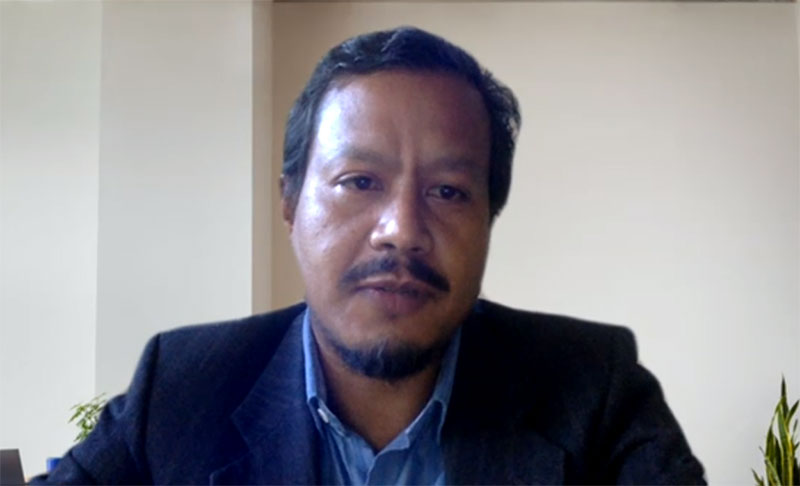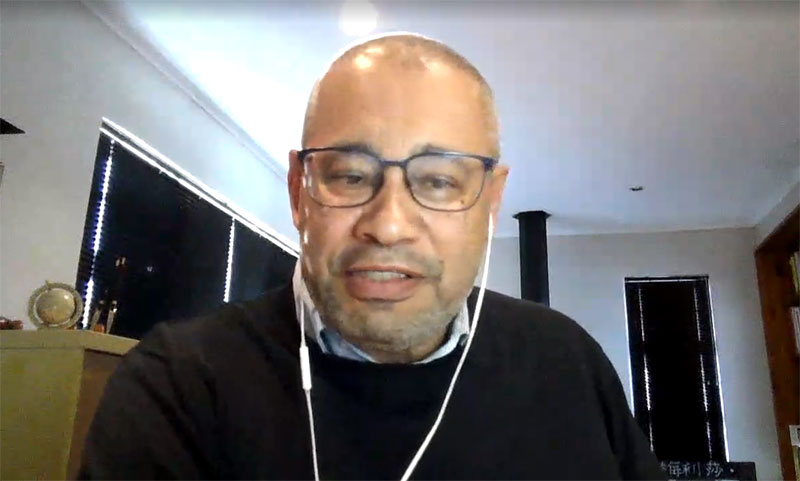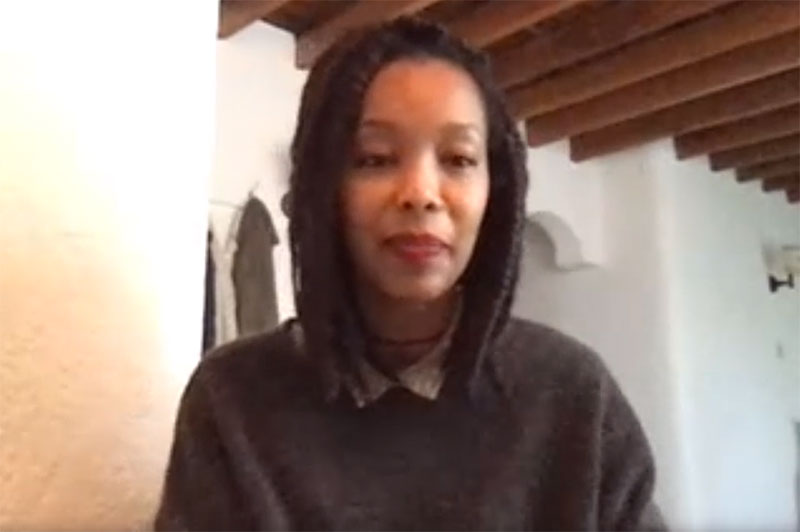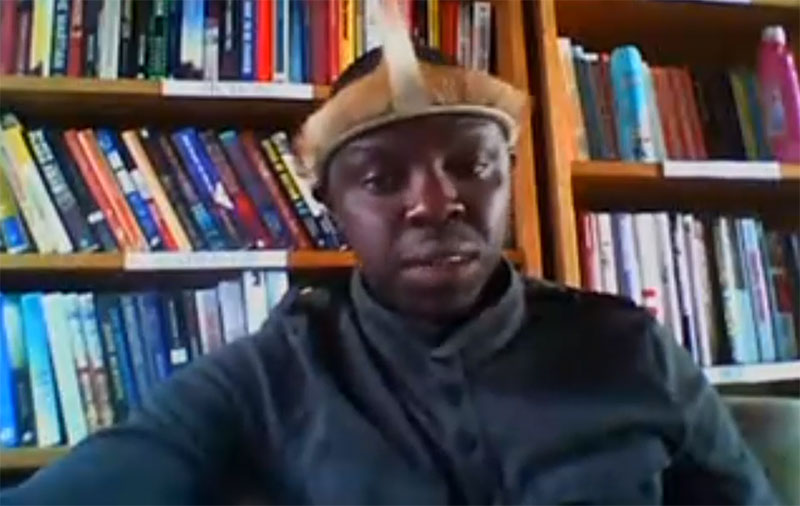Communities must use COVID-19 ‘chaos’ for change
30 June 2020 | Story Carla Bernardo. Read time 8 min.
“This is a necessary chaos. This is one of the most important chaotic periods we have as a species. It is the biggest opportunity for true decoloniality to occur.”
This is the view of Tauriq Jenkins on the COVID-19 pandemic, the impact of the crisis on communities, and the potential for change. Jenkins is an accredited South African Human Rights Commission (SAHRC) monitor, high commissioner of the Goringhaicona Khoi Khoin Indigenous Traditional Council, and the chair of the A/Xarra Restorative Justice Forum, which is based at the University of Cape Town’s (UCT) Centre for African Studies.

Jenkins was one of three panellists speaking about “community leadership in times of crisis”, the focus of the fourth conversation in the UCT Summer School’s “Unlocking COVID-19: Current realities, future opportunities?” series. The webinar series features conversations with leading authorities, UCT academics and alumni. This conversation, which took place on Wednesday, 24 June, was hosted by the UCT Klaus-Jürgen Bathe Leadership Programme, a scholarship programme that supports young future leaders at the university.
Joining Jenkins on the panel was Selam Kebede from Ethiopia and Nkosana Mazibiza from Zimbabwe. The moderator was Lorenzo Davids, the chief executive officer of the Community Chest who is pursuing his MPhil in Social Innovation at UCT’s Graduate School of Business.

For Jenkins, this “necessary chaos” must belong to communities; it is crucial that they are at the centre of the change-making and that the narrative is that of the poor and working class. He warned that the status quo will be concretised if communities do not latch onto the opportunities presented by the chaos.
“The world has changed and so it is up to us to determine how that change is going to happen,” he said.
Dangerous precedent
After nearly 100 days in lockdown, Jenkins reflected on how government, civil society and communities had fared. In particular, he reflected on his experience as a SAHRC monitor reporting on violations during lockdown and as a human rights activist in the Western Cape.
Jenkins said that while South Africa had enjoyed relatively few confirmed cases in the earlier stages, many knew that there was the potential for an explosive situation. This was because of exacerbating factors, such as apartheid spatial planning, poverty and communities in high-density areas battling with tuberculosis and HIV/AIDS crises, and various other comorbidities. For Jenkins, the question was how the government would respond.
On the government’s deployment of the military, Jenkins said there was “a conflation in terms of the interpretation of what is a national disaster to what was a state of emergency”. He said the deployment evoked the memory of an experience which the country has been trying to move away from since 1994. Added to this was concerning behaviour by law enforcement, which includes demolitions, evictions and the harassment of informal traders.

Furthermore, under Level 5 of the lockdown, civil society and watchdog organisations were unable to fulfil their mandates because, said Jenkins, “they literally could not get out of the front door” and were initially not granted essential permits. He said this had left a vacuum on the streets and set a dangerous precedent.
Fortunately, it was at this moment that Chapter 9 institutions, such as the SAHRC, entered into agreements with civil society, extending their Section 11 mandate to allow civil society to continue their work on the ground.
Most vulnerable
Jenkins said that while the COVID-19 pandemic has affected South Africa’s most vulnerable the worst, it is also the most vulnerable in communities who have taken agency and have advocated for themselves.
“Around the country you’ve seen civil society poignantly identifying incidents of oppression and actually mobilising a lot of support around that,” he said.
To illustrate a way in which communities had mobilised, Jenkins used the example of the City of Cape Town’s relocation of almost 2 000 homeless people to Strandfontein. As an SAHRC monitor, Jenkins witnessed numerous human rights violations at the camp and added that the City attempted to interdict the SAHRC with a “gag order, seemingly to silence reports” of these violations. Fortunately, through the mobilisation and work of civil society and community members, the camp was eventually closed. This, said Jenkins, was indicative of the community’s consciousness, which has centred around responsibility for protecting the most vulnerable in society.

Another example of community mobilisation during the lockdown has been the formation of broad-based coalitions that are focused on protecting the most vulnerable. These coalitions, he said, are aware that at risk is not only the spread of COVID-19 and the loss of lives, but also “the very fibre of who we are as South Africans in terms of how we relate to our human rights”. It is because of this that Jenkins believes that despite the restrictive and unnatural conditions of lockdown, there has been “an extraordinary sense of mobility”.
“There is an extraordinary sense of action, of duty that is being deployed all around the country … we have been able to mobilise virtually and get to know people and communities virtually and almost find each other again,” he said. “And so, one of the most powerful things that have come about [in] this crisis is a common language of what we need to protect.”
New normal
Concluding the webinar conversation, Jenkins called for absolute vigilance from civil society and communities.
“What we have to be very careful of is the fact that whatever the ‘new normal’ is now, it should absolutely not be the new normal for us as civil society,” he warned.
As the lockdown comes to an end, Jenkins called on civil society and communities to identify and unpack areas where political power had been asserted. He said it was crucial to do so because often when countries emerge from disasters, authorities tend to extend restrictions from abnormal conditions to a normal situation.
“History will tell us that we have to be concerned. We need to be sure that our analysis is good and that we hold power to account,” he said.
 This work is licensed under a Creative Commons Attribution-NoDerivatives 4.0 International License.
This work is licensed under a Creative Commons Attribution-NoDerivatives 4.0 International License.
Please view the republishing articles page for more information.
UCT’s response to COVID-19
COVID-19 is a global pandemic that caused President Cyril Ramaphosa to declare a national disaster in South Africa on 15 March 2020 and to implement a national lockdown from 26 March 2020. UCT is taking the threat of infection in our university community extremely seriously, and this page will be updated with the latest COVID-19 information. Please note that the information on this page is subject to change depending on current lockdown regulations.
Minister of Health, Dr Joe Phaahla, has in June 2022 repealed some of South Africa’s remaining COVID-19 regulations: namely, sections 16A, 16B and 16C of the Regulations Relating to the Surveillance and the Control of Notifiable Medical Conditions under the National Health Act. We are now no longer required to wear masks or limit gatherings. Venue restrictions and checks for travellers coming into South Africa have now also been removed.
Read the latest document available on the UCT policies web page.
Campus communications
2022
UCT Community of Hope Vaccination Centre
On Wednesday, 20 July, staff from the University of Cape Town’s (UCT) Faculty of Health Sciences came together with representatives from the Western Cape Government at the UCT Community of Hope Vaccination Centre at Forest Hill Residence to acknowledge the centre’s significance in the fight against COVID-19 and to thank its staff for their contributions. The centre opened on 1 September 2021 with the aim of providing quality vaccination services to UCT staff, students and the nearby communities, as well as to create an opportunity for medical students from the Faculty of Health Sciences to gain practical public health skills. The vaccination centre ceased operations on Friday, 29 July 2022.
With the closure of the UCT Community of Hope Vaccination Centre, if you still require access to a COVID-19 vaccination site please visit the CovidComms SA website to find an alternative.
“After almost a year of operation, the University of Cape Town’s (UCT) Community of Hope Vaccination Centre, located at the Forest Hill residence complex in Mowbray, will close on Friday, 29 July 2022. I am extremely grateful and proud of all staff, students and everyone involved in this important project.”
– Vice-Chancellor Prof Mamokgethi PhakengWith the closure of the UCT Community of Hope Vaccination Centre, if you still require access to a COVID-19 vaccination site please visit the CovidComms SA website to find an alternative.
Frequently asked questions
Global Citizen Asks: Are COVID-19 Vaccines Safe & Effective?
UCT’s Institute of Infectious Disease and Molecular Medicine (IDM) collaborated with Global Citizen, speaking to trusted experts to dispel vaccine misinformation.
If you have further questions about the COVID-19 vaccine check out the FAQ produced by the Desmond Tutu Health Foundation (DTHF). The DTHF has developed a dedicated chat function where you can ask your vaccine-related questions on the bottom right hand corner of the website.
IDM YouTube channel | IDM website
“As a contact university, we look forward to readjusting our undergraduate and postgraduate programmes in 2023 as the COVID-19 regulations have been repealed.”
– Prof Harsha Kathard, Acting Deputy Vice-Chancellor: Teaching and Learning
We are continuing to monitor the situation and we will be updating the UCT community regularly – as and when there are further updates. If you are concerned or need more information, students can contact the Student Wellness Service on 021 650 5620 or 021 650 1271 (after hours), while staff can contact 021 650 5685.




















